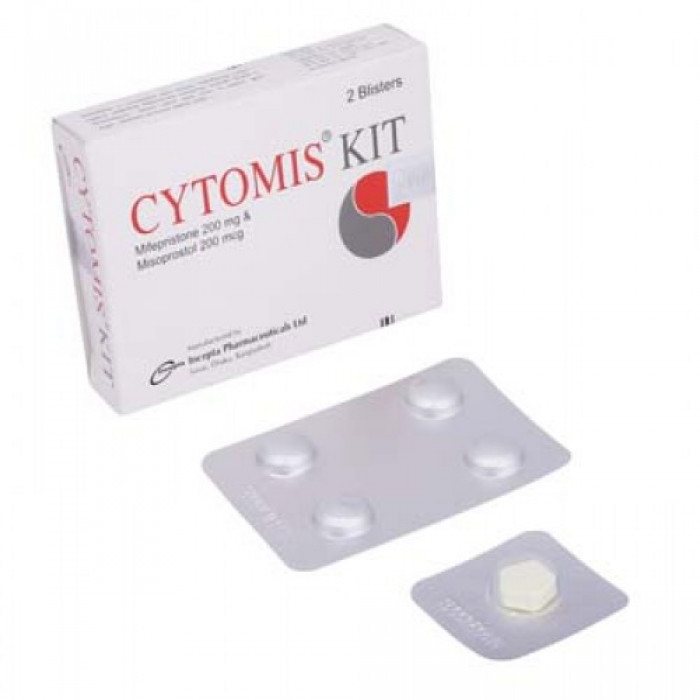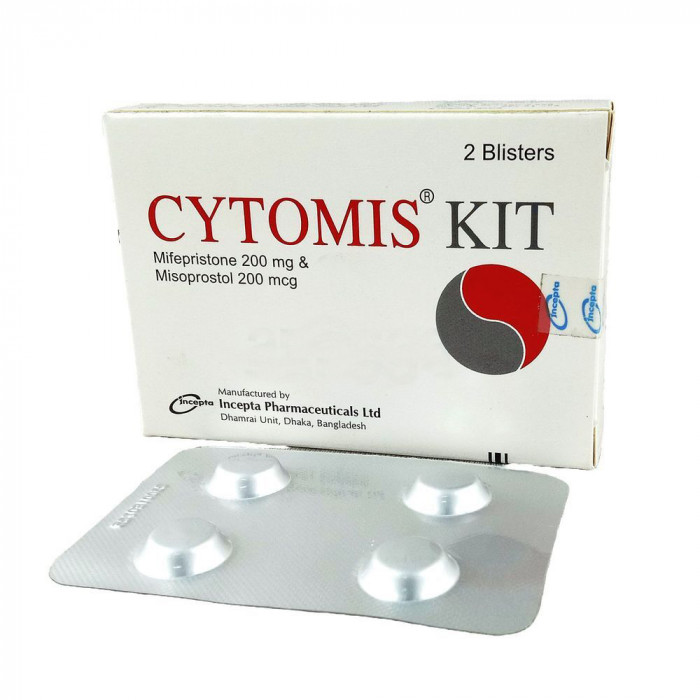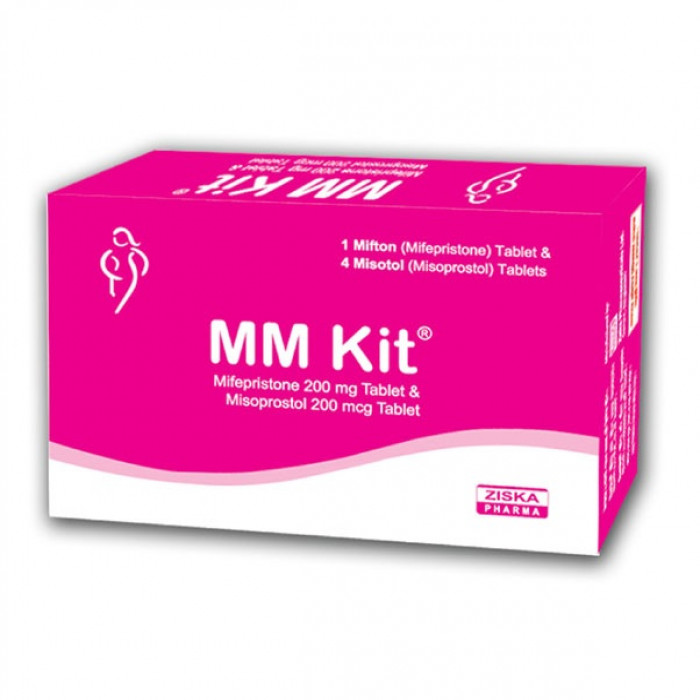

✔ 100% Authentic Product
👁️ Currently Viewing 3123
Cytomis Kit 2 Blisters
Mifepristone 200mg + Misoprostol 200 mcg is used for termination of pregnancy up to the 9th week(63 days) of gestation, and Early menstrual regulation.
Cytomis Kit combines Mifepristone and Misoprostol to induce abortion:
- Mifepristone blocks progesterone, leading to the breakdown of the uterine lining and halting pregnancy development.
- Misoprostol causes the uterus to contract and expel pregnancy tissue, completing the abortion.
- This kit is intended for early pregnancy termination.
- Avoid driving or tasks needing focus, as dizziness or drowsiness may occur.
- Fertility is not affected long-term; use contraceptives to prevent future pregnancies.
📄Prescription Required
Discount
Price: ৳ 297
MRP:
৳
300
1%
Off

100% Genuine Products, Guaranteed

Safe & Secure Payments, Always

Fast, Secure & Efficient Delivery

Proper Packaging
 Cash on Delivery - All over Bangladesh
Cash on Delivery - All over Bangladesh Regular Delivery - 12-24 Hours, Dhaka City* Charge Tk.39-59
Regular Delivery - 12-24 Hours, Dhaka City* Charge Tk.39-59 Regular Delivery - 24-48 Hours, Other Cities* Charge Tk.99-110
Regular Delivery - 24-48 Hours, Other Cities* Charge Tk.99-110
 ফ্রি ডেলিভারিঃ - ৯৯৯ টাকা+ অর্ডারে, ঢাকা
শহরে
ফ্রি ডেলিভারিঃ - ৯৯৯ টাকা+ অর্ডারে, ঢাকা
শহরে ফ্রি ডেলিভারিঃ - ২৯৯৯ টাকা+ অর্ডারে, ঢাকার
বাহিরে
ফ্রি ডেলিভারিঃ - ২৯৯৯ টাকা+ অর্ডারে, ঢাকার
বাহিরে
100% Genuine Products, Guaranteed
Safe & Secure Payments, Always
Fast, Secure & Efficient Delivery
Proper Packaging
 Cash on Delivery - All over Bangladesh
Cash on Delivery - All over Bangladesh Regular Delivery - 12-24 Hours, Dhaka City* Charge Tk.39-59
Regular Delivery - 12-24 Hours, Dhaka City* Charge Tk.39-59 Regular Delivery - 24-48 Hours, Other Cities* Charge Tk.99-110
Regular Delivery - 24-48 Hours, Other Cities* Charge Tk.99-110 ফ্রি ডেলিভারিঃ - ৯৯৯ টাকা+ অর্ডারে, ঢাকা
শহরে
ফ্রি ডেলিভারিঃ - ৯৯৯ টাকা+ অর্ডারে, ঢাকা
শহরে ফ্রি ডেলিভারিঃ - ২৯৯৯ টাকা+ অর্ডারে, ঢাকার
বাহিরে
ফ্রি ডেলিভারিঃ - ২৯৯৯ টাকা+ অর্ডারে, ঢাকার
বাহিরে
✅ Description:
Cytomis Kit is a combination medication used to medically terminate a pregnancy. It contains two active ingredients—Mifepristone and Misoprostol—that work together to end an early pregnancy. Mifepristone functions by inhibiting progesterone, a hormone essential for sustaining pregnancy, while Misoprostol induces uterine contractions to complete the abortion process.
Before using this medication, inform your doctor if you:
- Have a history of ectopic pregnancy
- Are currently breastfeeding
- Are using an intrauterine device (IUD)
Also, disclose all ongoing medications, as some drugs can interfere with the effectiveness of Cytomis Kit. - Avoid intense physical activity such as heavy exercise, running, or driving, as it can worsen bleeding during the abortion process. Your doctor may recommend an ultrasound or pelvic exam afterward to ensure the abortion is complete.
✔️ Common Side Effects
- Nausea
- Vomiting
- Diarrhea
- Abdominal pain or cramps
- Uterine contractions
- Heavy menstrual bleeding (menorrhagia)
While these are generally expected, consult your doctor if they become intense or unmanageable. Seek immediate medical attention if you experience excessive bleeding or persistent abdominal pain.
✔️ Adult Dosage Schedule
Day 1 (Initial Visit):
A single 200 mg tablet of Mifepristone is taken orally under the direct supervision of a healthcare provider at a clinic or hospital.
Day 2 (Second Visit):
After 24 to 48 hours, the patient takes four 200 mcg tablets of Misoprostol (total 800 mcg) buccally. This means placing two tablets on each side of the mouth between the cheek and gum, allowing them to dissolve for 30 minutes before swallowing any remnants.
Pain or discomfort, such as cramping, may occur after taking Misoprostol. Supportive medication for pain relief may be required. Patients should also be provided with a contact number for emergency questions or concerns following Misoprostol use.
Day 10–14 (Follow-Up Visit):
A follow-up appointment is essential within 10 to 14 days of Mifepristone administration. This visit includes a clinical evaluation or ultrasound scan to confirm that the abortion is complete. If the pregnancy continues, there is a risk of fetal deformity, and a surgical abortion or manual vacuum aspiration (MVA) is advised to complete the process.
✔️ Drug Interactions
- Aspirin and NSAIDs: These may reduce the effectiveness of Mifepristone.
- Corticosteroids (including inhaled forms): Mifepristone can lower the efficacy of corticosteroids. Patients should be monitored during and for several days after concurrent use.
- Oxytocin: Mifepristone may enhance the uterine-contracting effects of oxytocin.
- Magnesium-based antacids: When used with Misoprostol, they may increase the likelihood of diarrhea.
✔️ Cytomis Kit should not be used in individuals with the following conditions:
- Known or suspected ectopic pregnancy
- Adrenal gland disorders (e.g., chronic adrenal insufficiency)
- Ongoing corticosteroid therapy
- Allergy to Mifepristone, Misoprostol, or other prostaglandins
- Bleeding disorders or concurrent use of blood thinners
- Porphyria, or liver/kidney dysfunction
- Use during pregnancy/lactation (if the intention is not abortion)
- Presence of an intrauterine device (IUD)
- Unexplained adnexal mass (which may suggest ectopic pregnancy)
✔️ Monitoring Guidelines
Perform a pregnancy test before initiating treatment in women of childbearing potential.
When used for labor induction, monitor for:
- Uterine contractions
- Fetal condition (if applicable)
✔️ Important Precautions
- Pregnancy Confirmation: Do not use if there is uncertainty about whether the patient is pregnant or the gestational age is unclear. An ultrasound scan and/or beta-hCG test must be conducted before initiating treatment.
- Ectopic Pregnancy: Do not use if extra-uterine (ectopic) pregnancy is suspected.
- Gestational Limit: For first-trimester abortions, Mifepristone should not be used beyond 49 days of amenorrhea when paired with Misoprostol.
- Patients prone to diarrhea, such as those with inflammatory bowel disease
- Those with cardiovascular disorders (e.g., coronary artery disease, cerebrovascular disease, hypertension)
- Any condition where low blood pressure may cause complications
- Dehydration risk
- Renal impairment
- During lactation
⚠️Disclaimer:
At ePharma, we’re committed to providing accurate and accessible health information. However, all content is intended for informational purposes only and should not replace medical advice from a qualified physician. Please consult your healthcare provider for personalized guidance. We aim to support, not substitute, the doctor-patient relationship.








